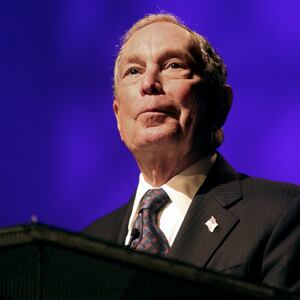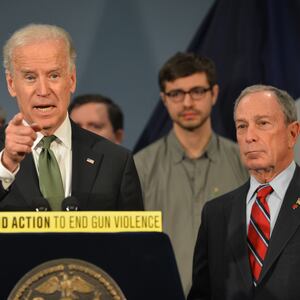Elizabeth Warren, who has spent much of the election staying clear of directly attacking political opponents while railing against systematic corruption, faces a new reality: a 77-year-old rich guy worth $54 billion has bulldozed into the Democratic primary. And Bernie Sanders, whose crusade against the billionaire class has become as ubiquitous as the finger wave that accompanies it, now has another reason to chomp at the bit.
Enter: Michael Bloomberg, the latest billionaire to declare he is running for the Democratic nomination in 2020. In announcing his bid on Sunday, the former New York City mayor said he is running to “defeat Donald Trump and rebuild America.” In a statement and accompanying video, he said, “we cannot afford four more years of President Trump’s reckless and unethical actions. He represents an existential threat to our country and our values. If he wins another term in office, we may never recover from the damage.”
Allies of Warren and Sanders allies don’t think Bloomberg, a New Yorker by way of Medford, Massachusetts, will have the chance to take on fellow New Yorker, Donald Trump. In fact, they view the billionaire’s entrance into the party’s primary as a political gift.
“This may be one of the most important things that happened to her campaign,” said Adam Green, co-founder of the Progressive Change Campaign Committee, which is supporting Warren. “Bloomberg’s entrance centers the conversation to the core themes that have been instrumental to Elizabeth Warren’s rise,” he said, including “the systemic corruption of our democracy by billionaires.”
“The more the campaign is grounded and centered in those issues, the more likely it is that Elizabeth Warren will win.”
Reached by The Daily Beast, a Bloomberg aide texted it is “not a surprise” when asked about jabs from Warren and Sanders escalating with his arrival into the field. A Sanders aide flagged their campaign’s recent statement on Bloomberg’s candidacy, while a spokesperson for Warren’s campaign passed along her relevant remarks from a recent event.
Bloomberg’s video is just one part of a $34 million ad buy, according to Advertising Analytics’ latest estimate of campaign spending shared with The Daily Beast. On Thursday, he officially filed paperwork with the Federal Election Commission. His aides have said he plans to take no campaign donations and will work for $1 a year if he’s elected, adding Bloomberg “cannot be bought.”
Bloomberg’s bid comes less than three months before voters begin selecting candidates in the first caucus and primary states. Warren and Sanders, who are statistically tied for the second place spot in national polling averages, will now have not one, but two, billionaires vying for the party’s nomination, including California mega-donor Tom Steyer.
Sanders and Warren sit roughly 10 points behind Joe Biden in national averages. And Bloomberg’s bid is viewed, largely, as a show of force against the former vice president, who has struggled with fundraising and momentum despite remaining relatively even in polling averages throughout the contest.
Eyeing those factors, several Democratic strategists who have already started grumbling about Bloomberg said his candidacy throws a potential wrench into Biden’s campaign, The Daily Beast previously reported. It could also complicate the path for South Bend Mayor Pete Buttigieg, who has skyrocketed ahead in several surveys in Iowa in New Hampshire, strategists said.
Multiple Democratic operatives and activists supportive of Warren and Sanders agreed that for their candidates, it’s a different story entirely.
“There are a lot of things you can say about Bloomberg,” Matt Bruenig, founder of the progressive People’s Policy Project, told The Daily Beast. “Not only is he a billionaire, but he’s a Wall Street billionaire, so you get that angle. If they stay to script, they’ll have more things to say.”
Warren and Sanders each have robust small-dollar fundraising operations and have spent much of their campaigns fighting against claims of corruption around the country. Warren has focused on what she calls systemic corruption and challenging corporate power, saying the “government is working great for billionaires” but not for every day Americans. Sanders has fine-tuned his “rigged political system” messaging left over from 2016, where he mounted a strong grassroots challenge to Hillary Clinton by criticizing wealthy donors and occasionally calling out billionaires by name. Amazon’s CEO Jeff Bezos, who reportedly asked Bloomberg about a potential run, is a favorite target of Sanders this cycle.
Over the past few days, Sanders has doubled down on his message for the one percent, saying he’s “disgusted” that Bloomberg or other billionaires believe they can buy election results. His misgivings about “the billionaires” have been as consistent in his second presidential bid as it was in his first.
“I’m disgusted by the idea that Michael Bloomberg or any other billionaire thinks they can circumvent the political process and spend tens of millions of dollars to buy our elections,” Sanders wrote in a statement. “It’s just the latest example of a rigged political system that we are going to change when we’re in the White House. If you can’t build grassroots support for your candidacy, you have no business running for president. The American people are sick and tired of the power of billionaires, and I suspect they won’t react well to someone trying to buy an election.”
The move comes after Sanders’ campaign launched a new Facebook ad featuring the 78-year-old senator looking at the camera and addressing supporters, while name-dropping the billionaire directly. “Please make a contribution to help us say to Michael Bloomberg and the entire billionaire class: ‘sorry you're not going to buy this election.”
Warren, who became a progressive champion of working class families in 2008 for fighting against big banks during the financial crisis, hasn’t been shy about clapping back against attacks from the uber-rich, either, going hard against well-heeled figures like billionaire hedge-fund manager Leon Cooperman and Goldman Sachs senior chairman Lloyd Blankfein.
On Saturday, while campaigning in New Hampshire, Warren told reporters “elections should not be for sale, not to billionaires, not to corporate executives,” when asked about Bloomberg’s potential run before his official announcement.
Warren’s comments are consistent with her campaign’s messaging strategy that’s evolved through her nine-and-a-half-month-long bid. Her campaign’s website now features promotional coffee mugs emblazoned with “BILLIONAIRES TEARS” and an online calculator that helps “confused billionaires” see exactly how much they would pay in taxes under her campaign’s wealth tax plan, which would start on individuals with a net worth starting at $50 million.
“WOW — YOU’VE GOT A LOT OF MONEY!” the calculator spits out when a user clicks on the name Michael Bloomberg. The message continues: “You’d pay $3.079 billion next year under Elizabeth’s wealth tax. This amount, which you likely won’t even feel, will help us invest in education from birth through college and help finance health care for everyone. Good news - you’ll still be extraordinarily rich!”
While Sanders and Warren’s end goals are strikingly similar, stylistically, there are other contrasts between how the two New England senators distinguish their messages against the mega-rich. Some strategists noted that Warren tends to address corruption in broader terms on the campaign trail, but does not necessarily criticize wealthy individuals for making a lot of money. Instead, she asks them to simply do a little extra to pay their fair share. Sanders tends to go for the jugular, some said, calling it flat-out exploitation. In September, Sanders mused about the idea that “Billionaires should not exist,” going a step further than the Vermont independent’s usual stump speech.
“It seems like Bernie has been much more willing to say it is exploitation,” Bruing said.
In contrast, Bloomberg is one of the Democratic Party’s biggest donors. He has donated $112 million to Independence USA, his own super PAC, since 2012. And he has already started spending heavily on TV. Between Nov. 25 and Dec. 3, he has spent $34 million for ad time in 29 states, including several general election battlegrounds: Florida, Ohio, Pennsylvania, Wisconsin, Arizona, and Colorado, among others. For now, he omitted several early contests: Iowa, New Hampshire, Nevada, and South Carolina.
Bloomberg is expected to largely skip over those states, where both Warren and Sanders have already campaigned heavily and invested significant resources. He is also unlikely to qualify for the remaining debates under the Democratic National Committee’s rules that stipulate individual donor requirements.
A recent Morning Consult poll found that only four percent of Democratic voters would choose Bloomberg as their first pick. In that survey, Sanders was 20 percent of respondents’ first choice, while Warren was 18 percent. Biden is on the top, with 31 percent of respondents preferring him as their number one, which some progressives see as an opportunity with Bloomberg’s name in the hat.
“He’ll cannibalize support from other white male candidates … who want more corporate talking points, namely Biden and Buttigieg,” Green said.
Still, other Democrats aren’t as certain, arguing that yet another billionaire for multiple candidates to attack could make it harder for voters to see Warren and Sanders as the leading progressives, and might warm to others if they choose to criticize him in a similar fashion.
“The Bloomberg thing will be good for Buttigieg and Biden,” said Matt Stoller, a Hill veteran who now studies the influence of power. “It will give them the chance to blur the lines between Warren and Bernie.”








